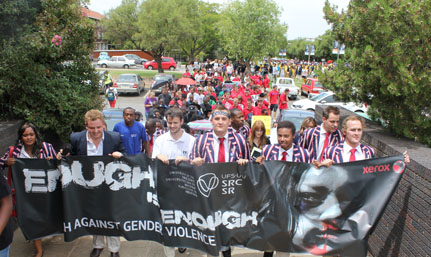|

|
A huge group of students, led by the Student Representative Council, took part in the "Enough is Enough: Are you man Enough?" march on the Bloemfontein Campus.
Photo: Johan Roux
25 February 2013 |
Enough is enough. The UFS took a vocal and visual stand against gender violence and rape with a march joining the national protest movement. With banners reading: ‘No to rape,’ ‘Stop sexual terrorism’ and ‘Enough is enough’, hundreds of Kovsie men and women took part in the Enough is Enough: Are you man Enough march held on the Bloemfontein Campus. Led by Mr Rudi Buys, Dean of Student Affairs, staff and students, mostly men, told the world what they think about the scourge of violence and rape in the country.
Addressing protestors, Prof Jonathan Jansen, Vice-Chancellor and Rector, highlighted shocking rape statistics, saying that it is dangerous to be a woman these days with a woman raped every minute somewhere in the country. “Women can hardly breathe without being worried.Culture has deceived our young men. The country is experiencing a tragic time. We need to raise our children, mostly boys, to respect women from an early age. They must also learn how to deal with their emotions – boys must learn how to cry.”
Joining Prof Jansen on stage was the Student Representative Council (SRC) presidents of three universities in South Africa – William Clayton from the UFS, Horne Hallendorff from the University of Cape Town and Clinton du Preez from Stellenbosch University. “Enough is indeed enough and men should take their role seriously to ensure that we say NO to gender violence and rape against women,” Clinton told protestors.
At the request of the Dean of Student Affairs, all the men that were present kneeled as a sign of apology of the selfish acts of men against women.
The university will continue the fight against gender violence with a series of dialogues creating awareness, but also facilitating broader understanding of gender violence.